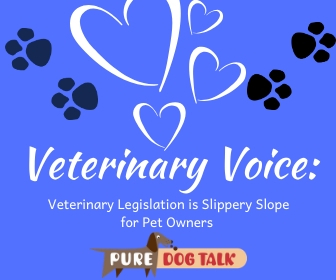354 – Veterinary Legislation is Slippery Slope for Pet Owners
Veterinary Legislation is Slippery Slope for Pet Owners
Dr. Marty Greer, DVM, NAIA (National Animal Interest Alliance) board member, puts on her legislative hat and talks with host Laura Reeves about proposed legislation in New York and around the US regarding crop, dock, declaw, bark softening and more.
“As soon as they start dictating to us what veterinary care we need and need not do, we are on a slippery slope we aren’t going to like,” Greer said. “Once they start saying you cannot do an ear crop, tail dock, declaw, bark softening… You MUST do a spay… then we get into you must do a dental cleaning, you must provide this level of veterinary care, you have all rights taken away as pet owner. If those things are mandated, we will have people stop getting veterinary care because it’s being dictated. That scares me a lot.”
These procedures should be a decision made between veterinary and client, Greer noted.
“While a veterinarian is involved, we can provide supportive care. Without veterinary involvement, it can fall into the hands of lay people, where we don’t have pain management or appropriate anesthesia. Once veterinarians lose these procedures, the level of care goes down for the animals.”
Veterinarians have been coerced into thinking this is not an ethical thing, Greer observed. Noting “those procedures are going to keep happening.”
Isn’t it ironic…
Meanwhile, as legislation is proposed banning these very safe, minimally invasive procedures, other legislation is advocating mandatory spay/neuter.
“Patients are being spayed/neutered too young and with insufficient care. Research has shown tremendous health risks with young spay/neuter,” Greer said. “And spay, particularly, is a major abdominal, full anesthesia procedure.
“The primary reason we spay/neuter is because we are unable or too lazy to manage our animals’ sexual behavior. There is no reason to spay/neuter our pets unless they have tumors. Less bone cancer. Less urinary incontinence. Less obesity when pets are left intact.
“People are being forced into having an invasive elective procedure done on their pets and then we tell them they can’t have a minor elective procedure, like bark softening, that allows them to keep the dog in their neighborhood.
“There are many more functional reasons to do tail docks, for example, than a spay.
“Our ancestors came to the US because they wanted the freedom to make decisions for themselves,” Greer insisted.

